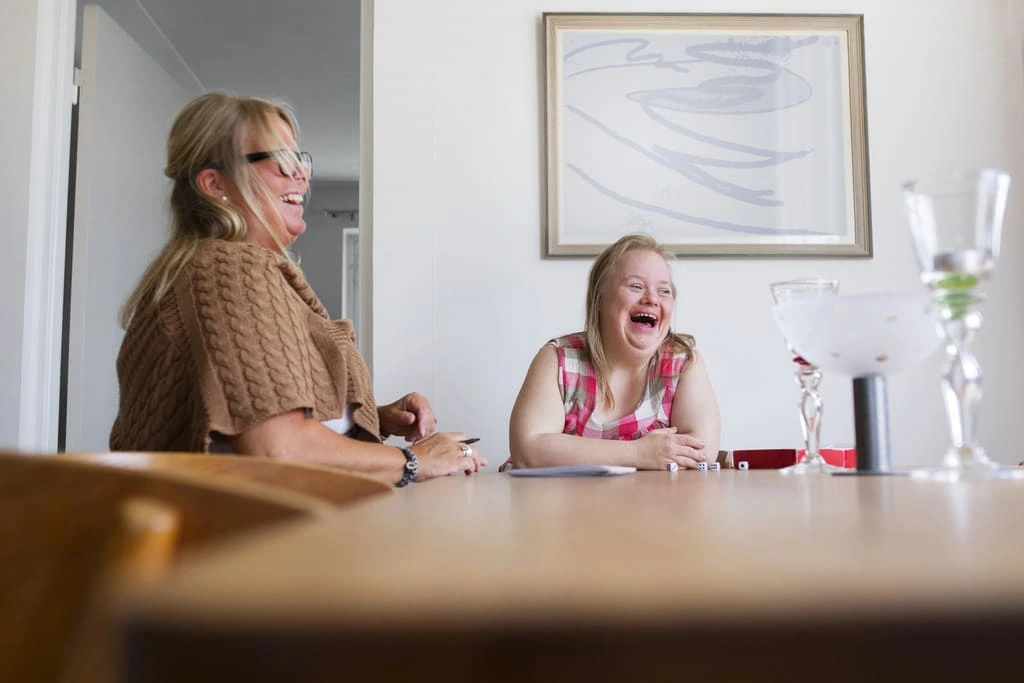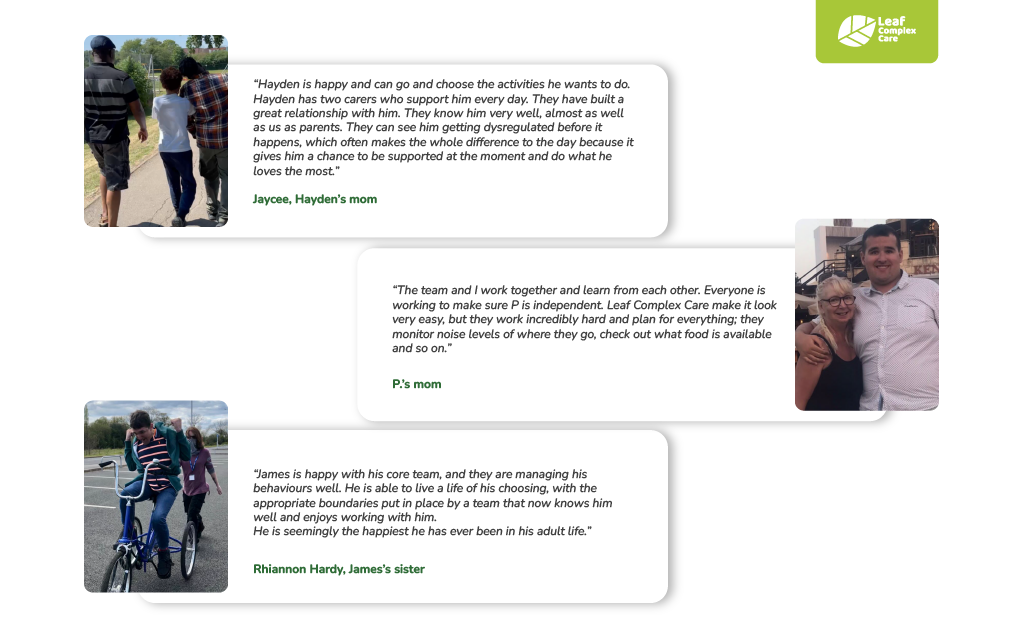The Role of Carers in Enhancing Quality of Life
When you have the right care team at home, their compassion and support enhance the quality of life for people who require complex care, particularly their mental health. Carers actively involve themselves in understanding the unique challenges people face. By collaborating with care professionals, carers can contribute significantly to developing and implementing tailored care plans prioritising mental health.
Creating safe and supportive environments is a gradual process that unfolds over time. There is consistent, dedicated and diligent work in providing humanised care that focuses on people’s choices and individual freedoms. Carers ensure that physical, emotional, and psychological safety is maintained and are actively involved in creating a safe environment. They work with care professionals to implement strategies that reduce the risks and promote a supportive atmosphere. Carers attend to the immediate care requirements, developing a sense of belonging and purpose for people with complex health challenges. Their active involvement in the lives of those they care for contributes to a holistic approach to health, addressing the physical and mental aspects of well-being.
Ways to Create a Safe and Supportive Environment
At Leaf Complex Care, the collaborative approach takes first place when it comes to creating safe and supportive environments for people requiring complex care, whether it is in their own homes, our supported living accommodations in Birmingham or the local community.
We believe that by emphasising the need to develop tailored care plans, interdisciplinary collaboration, effective communication, emotional support and a safe physical environment, followed by crisis intervention plans, we contribute to redesigning the care system. That way, we all partake in a journey that supports people’s well-being and social inclusion through person-centred care, education and development.
Bespoke Personalised Care Plans
When healthcare teams develop individualised care plans, there is only one thing on our minds – each person’s specific needs, choices, and challenges. This way, we can ensure a tailored and personalised approach to care. The centricity of personalised care plans has key aspects to consider in the development and implementation:
A thorough assessment of the person’s mental, physical and emotional health and social and environmental circumstances. The assessment can improve safety when the input is collected from the care professionals, the person themselves, and their support system, such as their family members.
Including individual goals through collaboration and a strength-based approach (SBA) to identify people’s talents, aspirations and goals. Supporting people’s personal goals also means enhancing their quality of life and achieving personal milestones.
Flexibility and adaptability are parts of recognising needs and are supported by strategies in place for regular re-assessment and adjustment as needed.
Collaboration with support networks, such as family support, friends, and community resources, in the development of the care plan will ensure that the care plan is personalised and considers the broader context in which the person lives.
Regular monitoring and evaluation with a system for ongoing monitoring of the care plan’s evolvement. Regular feedback from the person and the care team allows for timely adjustments and improvements to ensure optimal outcomes.
Informed decision-making empowers people needing complex care to apply their right to decide on what type of care they receive. Providing information and ensuring they understand their options gives a sense of control and autonomy.
Effective Communication
Establishing clear and open communication among all stakeholders involved in the care process includes maintaining transparent communication with the person, the family, and caregivers to enable an informed approach that results in a positive care environment. This is among the many elements people and their families want and focus on when choosing health services from a specific care provider.

Creating a Safe Physical Environment
For the person to stay safe, an environment must ensure safety because it directly impacts well-being and daily living functioning. Adaptations to mobility and accessibility needs and fall prevention measures are focal points in providing safety for supported people and their families. When it comes to home safety assessments, there is a need to identify the potential hazards that could threaten a person’s health. At Leaf Complex Care, we have occupational therapists who specialise in home safety evaluations, such as maintaining a safe environment with proper lighting, clear pathways, and secure furniture arrangements.
Assistive technology, comfortable and functional spaces, regular maintenance, and communication aids additionally contribute to creating a secure and supporting living space for individuals with complex needs.
⇒ Read more about our multidisciplinary therapy team’s support and learn more about their expertise.
Consistent Routine
A predictable schedule provides stability and structure, which can bring many benefits, especially to people experiencing challenges related to mental health or cognitive difficulties. People who need complex care often thrive in environments where they know what to expect. A consistent routine helps minimise uncertainty and reduces anxiety, providing security. Knowing when certain activities, meals, or caregiving tasks will occur allows individuals to feel more in control of their surroundings.
Regularity in daily routines, especially concerning sleep, can positively impact sleep patterns and help regulate sleep-wake cycles, promoting better rest and overall well-being. Trust is developed as caregivers consistently engage in caregiving tasks and activities, and a connection is established. Therefore, a routine allows caregivers to build a stronger and more trusting relationship with the person.
Promote Independence
Understanding people’s strengths and abilities allows caregivers to tailor support to maximise independence without compromising safety. Our care teams collaboratively set realistic and achievable goals with the individual. Breaking down larger tasks into smaller, manageable objectives fosters a sense of accomplishment and motivates ongoing efforts toward independence. When people are involved in decision-making processes related to their care, and this could include choices about daily routines, preferred activities, or involvement in social events, the feeling included in decisions fosters an additional sense of control and autonomy.
What’s also of great importance is to design a physical environment that will promote greater independence, such as accessible living spaces and clear pathways that will allow the person to move freely and confidently. A new purpose in life is found where there is respect for people’s dignity and self-worth.
Person-centred Care
Person-centred care prioritises treating people with dignity and respect. It respects their autonomy and recognises their right to make choices about their own lives, including the received care. In the context of complex care, person-centred care becomes even more critical as it shifts the focus from ‘condition’ to the person as a whole. Person-centred care involves developing care plans that are individualised to provide positive outcomes. These plans consider the person’s social needs and emotional and psychological well-being. Support workers can provide more meaningful support by understanding the person’s history, preferences, and values.
Leaf Complex Care maximises the person’s choice so that people can live as independently as possible. We would appreciate it if you take a moment and watch Jacob’s care journey in his mother’s words towards living the best life possible.
The person-centred care encourages people to actively participate in decisions about their care. This includes involving them in discussions about treatment options, setting goals, and determining the overall direction of their care journey. Actively involving the person in decision-making empowers people and promotes a sense of ownership over their health and safety.
If you would like to learn more about Leaf Complex Care’s commitment to people who require complex care, please take a moment to read our case studies.
Social Inclusion
Social inclusion involves enabling belonging and actively engaging people in meaningful social activity engagement within their communities. One aspect of social inclusion involves organising and facilitating activities to encourage participation. These activities should be adapted to meet the person’s abilities and preferences, enabling feelings of accomplishment and connection. This could include group outings, hobby-based clubs, or participation in community events.
Additionally, carers are aware of the potential barriers to participation, so this may mean a need to provide necessary accommodations to ensure accessibility and educate community members to foster a more inclusive attitude. Moreover, the integration of technology can be leveraged to enhance social inclusion. Virtual platforms and social media can improve connections, allowing people to interact with others even when physical barriers exist. Ultimately, social inclusion is about being physically present in a community and feeling valued, respected, and connected.
Staff Training and Development
Continuous education and learning ensure that support workers are provided with the latest knowledge and skills, enabling a dynamic and responsive approach to care. As a mindful organisation that invests in our people’s role and vocation in life, we have arranged free training for our support workers and in-house therapy team. The training consists of mandatory, practical and optional training in many fields where we can advance our provision of services.
Trained in PROACT SCIP-r, Autism Support, Learning Disabilities Support, and Positive Behaviour Support (PBS), our care teams partake in CQC Compliance, Care Legislation, and Supporting People to Be the Best Version of Themselves, among many of our awareness training courses.


The Best Quality of Care Means the Best Quality of Life
Enabling the best quality of care is inseparable from the concept of achieving the best quality of life. The Care Quality Commission (CQC) in the United Kingdom plays a crucial role in ensuring that health and social care providers deliver high-quality care for people requiring complex care.
At the latest CQC inspection we have been recognised for GOOD provision of care by our Bristol office team. Providing safe and supportive services means we are on the right track, and our continuity of care is deeply rooted in providing the right support, the right care and the right culture.
In a safe and supportive environment, the best quality of care ensures physical safety and takes care of the person’s psychological and emotional state. It involves creating spaces where people feel secure, valued, and understood. Care teams collaborate to design and implement personalised care plans that acknowledge the complexity of the person’s needs. This might include mental health support, recreational activities, and social engagement that contribute to an enriched and fulfilling life.
Quality Care and Support with Leaf Complex Care
At Leaf Complex Care, our aim is to underpin our care through the honest feedback we receive from the families and people we support, care professionals, social workers and commissioners. We believe that communication is crucial in providing quality care through a humanised and person-centred approach. This ensures everyone is on the same page regarding the person’s needs, goals, and any changes in their care journey.
Here, you can read some of the feedback we’ve received from the families we assist.


Leaf Complex Care operates from 3 locations: Bristol, Birmingham and Somerset.
Contact us today and receive the care everyone deserves!







